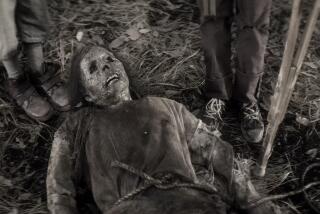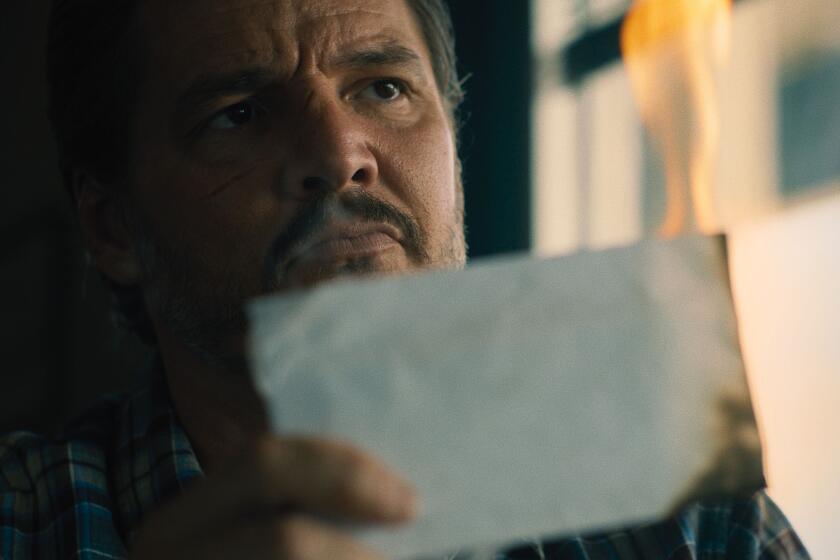Acting on a killer instinct
- Share via
The first thing you notice are the alert, green eyes. Then the perfectly cleft chin, the almost cruelly sensual mouth, the hair that falls artfully back into place no matter how many times he musses it up for a photographer.
“Last one!” the cameraman promises Edgar Ramirez, who’s been patiently posing on a Mid-Wilshire office balcony for 20 minutes.
Is this the face of a revolutionary, a terrorist, a wanton assassin, a brutal soldier of fortune? The face that launched 1,000 ammunition rounds in movies such as Tony Scott’s “Domino,” Paul Greengrass’ “The Bourne Ultimatum” and “Che,” by Steven Soderbergh?
This year, Ramirez has added another stubbled portrait to his gallery of lethal anti-heroes who are defined more by deeds than dialogue and wield words like blunt weapons. He’s the title character in Olivier Assayas’ “Carlos,” a five-hour epic about the exploits of Ilich Ramirez Sanchez, the real-life, Venezuelan-born international terrorist known as Carlos the Jackal who spread bloody mayhem across Europe in the 1970s and ‘80s. The film, which aired on the Sundance Channel last week, will play a one-week run starting Friday at the American Cinematheque’s Egyptian Theatre in Hollywood.
Next year, Ramirez will appear on-screen as another charismatic rogue, the late Colombian drug lord Pablo Escobar, in Joe Carnahan’s “Killing Pablo.” For the 33-year-old Venezuelan actor, the son of a military attache, playing debonair, dangerous men of action appears to come somewhat naturally.
“I’m restless,” says Ramirez, who grew up in several different countries, speaks Spanish, English, French, Italian and German and now makes his home in Caracas, Venezuela. “I’m all the time here and there and trying to get myself busy and creative. It’s something that’s part of my personality, since I was a kid.”
But Ramirez’s creative restlessness, like his low-key machismo, is only one part of a fluid personality. While he was growing up, his family moved from Bogota, Colombia, to Mexico, Austria, Canada and across Venezuela. Switching schools constantly, he learned how to fit in quickly, a trait that’s served his acting career well.
“You get to a new school and you’re the new guy or you’re the foreigner or you’re the guy with the funny accent,” he says. “That first day at school was a whole new opportunity to create a new persona.”
The same aptitude assisted the peripatetic and prismatic Carlos, who blazed a trail of kidnappings, hijackings, bombings and murders that stretched from Paris and London to Beirut, Damascus, Syria; and North Africa. Tracking his moves, the press speculated about Carlos’ motives: Was he a revolutionary idealist bent on overthrowing the bourgeois imperialists and freeing the masses? Or a bumbling, cynical gun-for-hire acting out a B-grade thriller in the movie house of his own mind?
Character study
Ramirez, who spent months researching the character and the explosive era in which he operated (including interviewing members of the terrorist’s family), says the filmmakers wanted to strip away the myth of Carlos without presuming to psychoanalyze him.
“Carlos was a character, a character fabricated by Ilich Ramirez Sanchez, fabricated by the secret services of the epoch, fabricated by the governments of the epoch, by the radical groups of the epoch, by the communications media,” he says.
One quality that needed no fabrication, he says, was Carlos’ charisma. “We are all seduced by charismatic people, whether it’s in your office or in the bus or in the train. There are people who just like come through the door and everybody turns around and looks at them and feels drawn to them.”
Originally made for French TV, “Carlos” builds suspense through tense action set-pieces and finely calibrated character studies that jostle with trenchant geopolitical analysis and some memorable erotic interludes, one involving a hand grenade used as an object of foreplay.
The movie premiered at this year’s Cannes Film Festival, where both the film and its star drew critical superlatives.
Assayas says that when he set out to co-write the “Carlos” screenplay, he never expected to find an actor who would be a perfect match for the role in terms of age, build, intellect and ethnicity, and brimming with enough seductive sang-froid to hold an audience’s attention for nearly every scene of a 300-page screenplay. Then he met Ramirez.
“Frankly, I think a computer would have cast him,” Assayas says in a phone interview. “To me it was instantly obvious that he was the best possible option as Carlos.”
It wasn’t always obvious to Ramirez that acting would be his calling. After studying journalism in college, he set his sights on becoming a diplomat. He also served as executive director of a Venezuelan nongovernmental organization similar to Rock the Vote.
It was the Mexican screenwriter Guillermo Arriaga (“Amores Perros”) who steered Ramirez toward acting after seeing him perform in a short film. But his real break came when Elia Schneider, one of Venezuela’s most respected directors, cast him in “Punto y Raya” (Step Forward), a black comedy about rival Colombian and Venezuelan soldiers.
Risk taker
Ramirez is a very intelligent actor who “takes risks” and “starts always with the physical part of the character, and through that he enters into the spiritual side of the person,” Schneider says by phone from Caracas. “It’s very important to him whether a character has a moustache or a beard or whatever.”
She pointed to a moment in “Carlos” when Ramirez stands naked before a mirror, as if contemplating his ruthless new identity. “It is a moment not of sexuality, but of solitude,” Schneider says.
Another close Venezuelan friend likewise emphasizes Ramirez’s physical approach to performing: Eloisa Maturen, a journalist, dancer and producer who is the wife of Gustavo Dudamel, the Los Angeles Philharmonic’s music director. Last spring, Maturen helped pick Ramirez to perform a spoken-word part in the Phil’s “Americas and Americans” festival, which she produced.
Maturen and Dudamel happened to run into Ramirez during filming of “Carlos,” first in Berlin, where he was slim and hard as a panther, then in Paris, when he’d put on 30 pounds to play the older, dissipated killer. “There’s something about him that’s powerful,” Maturen says. “I would compare him with Javier [Bardem]. It’s not perfectly Greek-style beauty. It’s the way it’s all put in place.”
For a man accustomed to playing chiseled, calculating warriors, Ramirez’s criteria for taking future roles are both broad and relaxed. He cites “Dancer in the Dark,” the “Matrix” trilogy and “When Harry Met Sally” among his favorite films, and says he’s not sure whether his roles find him or vice-versa.
“I think there’s some sort of like secret dance between the actor and his characters,” he says. “Somehow we kind of like smell each other or sense each other. Probably it’s kind of an organic thing. I don’t know how that dance really operates.”
--
More to Read
Only good movies
Get the Indie Focus newsletter, Mark Olsen's weekly guide to the world of cinema.
You may occasionally receive promotional content from the Los Angeles Times.









